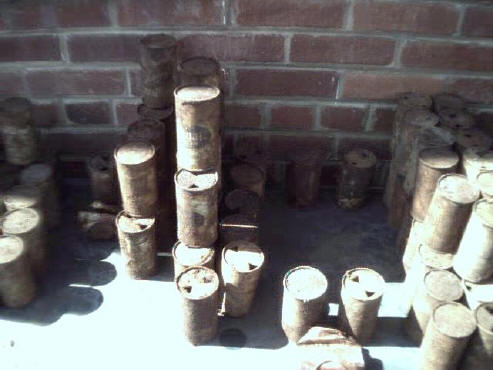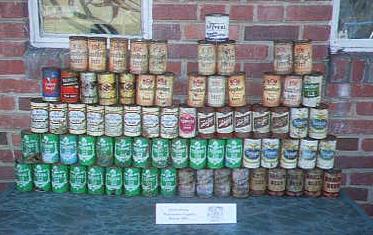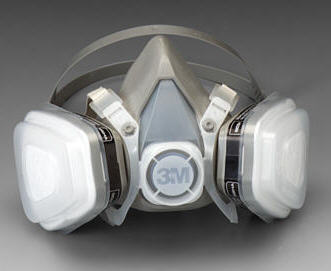Cleaning Old Beer Cans with Citric Acid
1. Wash the cans gently in warm water with a soft toothbrush or brush. DO NOT USE SOAP. I stopped using soap when I was told that the soap residue can weaken the acid. On old zip tops look out for the pull tabs coming out of the can with the dirt. Lots of people used to drop the tab into the can when they were done. You can buy strainers for tubs that fit over the drain at most hardware store for a dollar or so. You probably want to wash the cans outside or in a garage, remember, your new dumper may be a bug's home!
 |
A "before" picture and the same cans after cleaning. |
 |
2. Mix citric acid powder in HOT, but not boiling, water. Hot tap water is fine. Using water that is too hot will fade some red cans. I use 1/4 cup of citric acid powder per gallon of water. Always add acid to water, don't add water to acid!A chemist friends told me this was a safety precaution and a reader told me that it's because you may splash when you pour in the water. Makes sense to me!
I recently reduced the amount of acid I use after some more experienced dumpers tell me I use too strong a mixture. I've been much happier with the results since. I'm told I could even cut back on the quarter cup per gallon measure if I leave the cans soaking longer. I normally use an old beer cooler with a lid to keep the heat sealed in.
Wear long rubber gloves and old clothes because citric acid can leave brown stains. I always wear an old cook's apron. I used to clean cans in our 2d bathroom until my wife saw the brown splatter stains the acid made around the sink and tub. Oops!
If you use oxalic acid USE A REAL VENELATOR! Cheap paper/gauze masks don't do anything. I bought a painter's mask at the hardware store and it works great. Citric acid doesn't require a mask.
 |
3. Gently submerge the cans in the water. Some people fill the cans with tap water so the acid doesn't eat the can away from inside. I don't do this because if the can has holes the extra water will dilute the acid. If I haven't cleaned a can before in citric and I have several to clean then I clean one first as a test. I did not do this once and ruined two New England Ales when I could have only ruined one had I been careful. Some cans don't clean as well in citric as they do in oxalic. I found this to be true with some conetops and some late 50s cans with metallic paint such as the Gunther's "racetrack" can. Other paints, such as the heavy whites and reds you see on Old Germans, Rheingolds, and Black Labels seem to clean great in citric. I keep a churchkey handy in case I have to reopen the clogged holes in really dirty or heavily rusted cans.
4. Check the cans regularly. Lightly rusted cans may clean in a few hours, heavily rusted cans can take up to 48 hours in citric. I usually check every few hours and don't clean cans I need to check more frequently until I know I will have the time (such as on a weekend.) Be patient. If you keep opening your cooler to check the cans the acid will cool and will clean more slowly.
5. When checking the can wash it gently under warm running water. I often only use the water or a soft clean sponge to rinse off the rust and dirt. I don't usually use a brush except on bare metal such as the lids and seams. Some rubber gloves have ridges on the finger tips and I found these often work well in cleaning. If the can looks like it needs more time, resubmerge it. If it is done, dunk it in a mix of water and baking soda. I use about 1/4 cup in a gallon of lukewarm water. Let the can fill with the water to neutralize the acid inside the can as well as the outside. Then re-rinse the can under the faucet so the baking soda doesn't leave a white residue. NOTE, If you use oxalic instead of citric acid, don't use the oxalic in the sun as it will leave a yellow residue on the cans. I found this out the hard way!
6. Let the cans dry. I use a dish rack over a sink with a small fan.
Don't be surprised if some cans that you thought would turn out great don't survive the acid and if some mystery cans come out great! There's a real pleasure in watching the rust just run off a mystery can when rinsing off the acid to reveal a tough can in good display condition. On the flip side sometimes you can only watch as the paint washes off with the dirt and rust.
7. Dispose of the acid. The acid will wear out eventually, depending on how many cans you cleaned and how rusty and dirty they were. I normally can clean a bit more than a case of cans in a normal batch of acid consisting of several gallons. Check with your county or city first to see if they have rules that apply to disposal. I simply flush my acid after neutralizing it a little at a time with baking soda. DO NOT DUMP THE BAKING SODA STRAIGHT INTO THE ACID unless you want a real mess! (Another lesson learned the hard way!) But then, I don't have a septic tank and I have been told NOT to flush the old acid if you have a septic system.
I hope this helps.
Helpful Links:
BCCA: They sell a video tape "Let's Clean Cans" that is well worth buying.
The Chemistry Store: Citric Acid in bulk at a good price.
